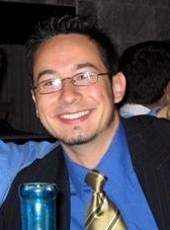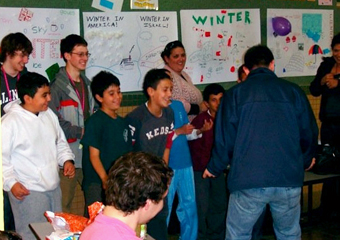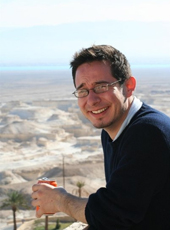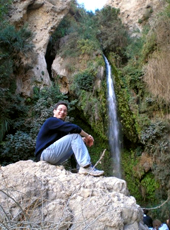From Hyde Park to the Farm and Back Again
Permanent link All Posts

Aaron Nunez-Gross is a Jewish Mexican-American man; he’s a city boy, yet was raised in the country too. He’s a about to graduate college, still finding his way in the world, but he’s also a guardian to his 17-year-old younger brother and a role model to other young people. He dances Flamenco and listens to Sephardic music; and he’s passionate about so much—about science, theology, politics, and peace in Israel.
As we sit down at a Hyde Park Greek diner on a cold February morning, the gregarious Nunez-Gross, 24, banters with the waitress in Spanish like they’re old friends. He’s been frequenting the diner for many years—as long as he’s lived in the neighborhood. He orders scrambled eggs, skirt steak and hash browns—his usual—and then begins to share with me his unique Jewish story.
Nunez-Gross was born in Mexico City in the mid-1980s and then came with his family to the States at the age of three. His father, a neuro-anesthesiologist, and his mother, a neurobiologist, previously had been on sabbatical from Duke University in Mexico, where his dad was born and raised. His father believes his family dates back to the Marranos, Spanish Jews who converted to Christianity to escape persecution, but practiced their Judaism in secret. Nunez-Gross’s family settled in Hyde Park, after his father was offered a position as a medical resident at the University of Chicago.
Though his family wasn’t traditionally observant—his mother served her kids BLTs in bed on their birthdays growing up—Nunez-Gross had a formal Jewish upbringing, including celebrating his bar mitzvah, lighting candles with his family on Friday nights, and attending Akiba-Schechter Jewish Day School on Chicago’s South Side. Post-eighth-grade graduation, Nunez-Gross spent the summer in Mexico with his grandmother and his half brother and half sister (from his father’s first marriage). He came home to Hyde Park at the end of summer, ready to start high school.
But his parents threw a monkey-wrench into his plan. “Guess what?” his folks sprang on their son. “We bought a dairy farm in Indiana.”
“I was furious,” says Nunez-Gross. “I had school and friends and my classes all picked out at the Chicago Lab School.” Yet his parents insisted. After all, they weren’t fans of city living even though they had spent many years in Hyde Park. They were country people—his father had grown up on the Mexican countryside in the southern town of Oaxaca, while his mother was raised on the countryside of England. Growing up, Nunez-Gross recalls his mother often criticizing Chicago and city life, which was a big part of why she wanted to relocate. “I remember once going with my mom downtown. She was carrying my younger brother (a baby at the time) and running to the car when she tripped and fell,” he says. “No one helped her up.”

Aaron visiting an elementary school in Israel, where the kids were studying the seasons, specifically winter in America vs. Israel. He taught them the song “Singin’ in the Rain” with full choreography.
So they were off to live life on the farm in the small town of Knox, Ind. “It was culture shock to say the least,” recalls Nunez-Gross. “You look at the Hyde Park community, a completely culturally heterogeneous area with, on average, a high level of education. I went from going to Akiba-Schechter in Chicago to a public high school out in burning brimstone fundamentalist Protestant USA. It was very, very strange.” On top of the culture shock, as soon as they moved to the farm, his mother cut the cords to the television. So, instead of watching TV, he would spend hours memorizing Shakespeare.
As a Jewish Mexican-American teen, Nunez-Gross realized he had little in common with the people in town. For the most part, he said, the people in town were “well-intentioned,” even if many were ignorant, and he managed to make friends there. But even among his friends, he experienced both anti-Semitism and racism. He and some other guys would be hanging out, playing video games when someone would call an African-American person a derogatory name.
There was one time when he was checking out books at the library when he noticed a girl staring at his head, clad in a baseball cap. “Can I see them?” she asked him. “See what?” he wondered. Then it struck him—she wanted to see his horns.
“When it hits that kind of level, you don’t get angry or offended,” he explains. “You don’t want to reciprocate by being patronizing. All you can do is joke.” So he took off his cap and let her touch his head and told her he would answer any of her other questions.
Nunez-Gross spent his high-school years on the farm, where he learned agrarian tasks such as milking cows and birthing calves and lambs. Although he considered himself an atheist at that point in life, he still felt a spiritual connection to the farm. “When you watch the spring lambs jump up and down in the field and everything is alive,” he says, “you can’t help but feel something in your heart, even the most obnoxious of atheists.”

Aaron at the top of Masada
He grew to appreciate his life on the farm in a way he couldn’t back in Chicago. “It really was probably one of the best decisions my parents could have made, because I had been a problem kid in the city, getting into trouble,” he says. “The beautiful thing about going to Indiana was, I was representing two minorities on my shoulders. I wasn’t just one of many, where I could do what I wanted and no one would judge me. I was now the Jewish boy in the country, the Hispanic boy. That forced me to get my [life] together.”
Even though he grew to like life in Indiana, he yearned to return to Hyde Park, so he applied and was accepted at the University of Chicago. He had a hard time keeping up with the rigorous academics of the university at first, but his studies improved and he developed an interest in politics and interned for former U.S. Rep. Rahm Emanuel, now President Obama’s chief of staff.
Later in college, Nunez-Gross regained his sense of faith that he had lost on the farm. He was an atheist in high school partly because of his experience with anti-Semitism, partly because he was the son of two scientists who had an “obligation to rationalism,” and partly because he was a teenager who thought he knew all the answers.
Then, one day, while sitting in an astrophysics class called “Evolution of the Solar System,” his professor was lecturing on black holes. The concept of black holes sounded oddly familiar to what Nunez-Gross had read about the creation of the world in the Zohar (considered the most important work of Kabbalah, or Jewish mysticism) about “a single infinitesimal point of immense density and energy which could not be seen.” He concluded that perhaps science and religion didn’t contradict each other. From that point on, he felt that he had the obligation to explore Judaism and theology in general. Eventually, he switched his major to Jewish Studies and last winter, he traveled to Israel for the first time on a Taglit-Birthright Israel trip.
This month, Nunez-Gross will graduate from the University of Chicago and take a job at the university’s Newberger Hillel, where he will act as an assistant to the director of engagement. He will also lead an Alternative Spring Break trip to New Orleans over spring break, and he will work with students traveling on Birthright Israel programs. He ultimately would like to make aliyah (immigrate to Israel). “I am a ferocious Zionist and love Israel with all my heart. I cannot wait to get my life and some money together and make aliyah,” says Nunez-Gross. “I would love to work on the peace process. Much needs to be done in terms of diplomacy between theological figures. There needs to be increased dialogue between imams and rabbis.” In addition to the peace process, he worries what the legacy of the Holocaust will be in a decade, when most of the survivor generation has perished.

Aaron at a waterfall in a national park near Be’er Sheva, Israel
Last year, he became guardian to his 17-year-old brother. During the presidential election, his family’s Indiana farm town had been fraught with heightened racism, spurring his brother to leave Indiana and move in with his older brother in Chicago. Nunez-Gross is trying to improve his Spanish and his brother is working on his Hebrew, so the two siblings often communicate with one another in the language they need practice in, which “comes out like some freakish form of what was once Ladino.”
Nunez-Gross looks back life on the farm with gratitude and says it helped make him the best person—and Jew—he could be. “Being thrust into that [dual]-minority position,” he recalls, “forced me to get my act together and start taking responsibility for who I am and where I come from.”



.jpg)



